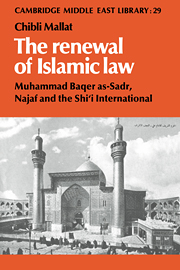Book contents
- Frontmatter
- Contents
- Acknowledgments
- Note on transliteration and dates
- General introduction: The law in the Islamic Renaissance and the role of Muhammad Baqer as-Sadr
- Part I Islamic law and the constitution
- Part II Islamic law, ‘Islamic economics’, and the interest-free bank
- Introduction to Part II
- 4 Law and the discovery of ‘Islamic economics’
- 5 Muhammad Baqer as-Sadr and Islamic banking
- Conclusion: The costs of renewal
- Notes
- Bibliography
- Index
- Cambridge Middle East Library
5 - Muhammad Baqer as-Sadr and Islamic banking
Published online by Cambridge University Press: 08 January 2010
- Frontmatter
- Contents
- Acknowledgments
- Note on transliteration and dates
- General introduction: The law in the Islamic Renaissance and the role of Muhammad Baqer as-Sadr
- Part I Islamic law and the constitution
- Part II Islamic law, ‘Islamic economics’, and the interest-free bank
- Introduction to Part II
- 4 Law and the discovery of ‘Islamic economics’
- 5 Muhammad Baqer as-Sadr and Islamic banking
- Conclusion: The costs of renewal
- Notes
- Bibliography
- Index
- Cambridge Middle East Library
Summary
At the heart of any legal debate over an alternative Islamic banking system lies the definition of the word riba. The word is mentioned several times in the Qur'an. In a concise form, the rule can be stated thus: ‘God has forbidden riba’ (Q :II, 275). Depending on the domain subsumed under the word, a number of financial, commercial and legal transactions will be included in, or excluded from, the Qur'anic prohibition. The issue is complicated by the distinction, which appears in the hadith, between riba annasi'a and riba al-fadl.
Riba an-nasi'a is the classical form of riba, which entails – as in a loan – a fixed increase (riba comes from the root verb raba, yarbu, to increase) in the amount of money over a time period. Riba al-fadl, which occurs in a contract of sales when there is an increase in the terms of exchange themselves, is also prohibited following the Prophet's injunction. A hadith mentions six commodities which constitute the object of riba al-fadl (the exchange riba): ‘Gold for gold, silver for silver, wheat for wheat, barley for barley, dates for dates, salt for salt, each kind for each kind, in hand: he who increases or asks for an increase commits riba (arba), alike whether he gives or takes.’
In the modern banking world, it is the first riba, riba an-nasi'a, which is the main source of contention. If riba is defined as usury, then there is little problem in charging interest on transactions in the way of conventional banking.
- Type
- Chapter
- Information
- The Renewal of Islamic LawMuhammad Baqer as-Sadr, Najaf and the Shi'i International, pp. 158 - 187Publisher: Cambridge University PressPrint publication year: 1993



